Freezer Door Left Open? Is Your Food Still Safe?
Author: Anne Cowart | Editor: Omar Alonso
Review & Research: Jen Worst & Chris Miller
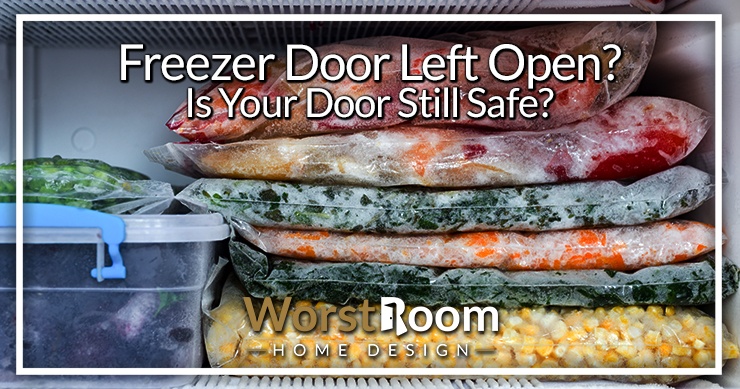
You walk into your kitchen and notice your freezer door left open for who knows how long. You start worrying. Is all of your food spoiled? Will your freezer still work? What do you do?
For short amounts of time, leaving your freezer open is usually unproblematic for your freezer and its contents. But what if you leave it open overnight or longer? How do you know what food to throw out or keep?
Continue reading to learn more about how to approach this common freezer mishap.
What Should You Do First?
So, you realize you left your freezer door open. It doesn't matter if it's a standalone freezer or a regular type of refrigerator. It's all about the food inside. So what happens next?
First, check how long you left the freezer door open. You may be able to save your freezer and its contents.
Second, check the freezer’s internal temperature. You will not need to replace anything as long as its temperature is at or below 0° Fahrenheit.
Third, evaluate your food. Check for signs of defrosting and meat products leaking in the freezer. This is another reason you don't want to put a mini fridge on carpet. They're going to leak at some point, and it might be nasty food leakage.
These are the best first steps to take.
How Long Can Your Freezer Door Stay Open?
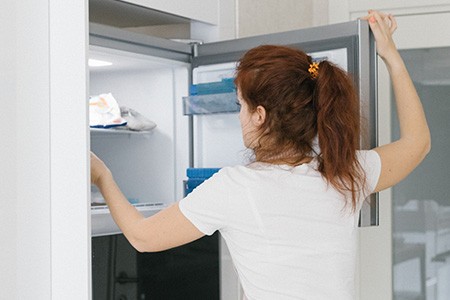
Closing your freezer door is crucial for your food's longevity. It takes up to 12 hours for most of your items to freeze. Each time you open and close the door, the temperature inside your freezer changes because you are letting in outside heat.
A freezer door left open for too long prematurely thaws your food. Different effects impact your freezer depending on how long the door stays open. Use this guide below to determine the damage that might occur.
30 Minutes
After leaving your freezer door open for about 30 minutes, you should notice minimal changes to your freezer, its contents, and the surrounding environment.
A freezer door left open for 30 minutes does not mean you need to throw out all of your food. The food should not have thawed or melted yet, so it is still safe to eat.
You may notice the temperature of the room drop as cold air seeps into the area. You may also see some ice begin building onto your food.
One Hour
You shouldn’t notice much difference after leaving your freezer door open for an hour compared to 30 minutes.
If you accidentally leave the freezer door open for an hour, your food should still be safe for consumption, as it is still frozen.
The room’s temperature will continue dropping since cold freezer air replaces the regular air.
You will notice more ice crystals forming over your food packages and crystals developing over the interior of your freezer door.
Overnight
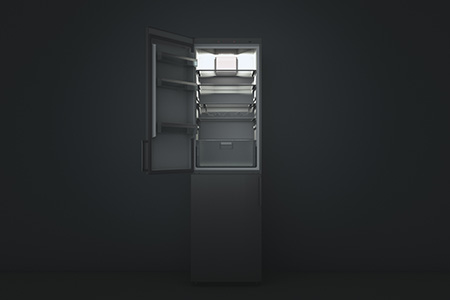
If you leave your freezer door open overnight (or up to 12 hours), you will notice the start of some more significant changes.
Ice continues forming a wall over the door and front of your freezer. There might be so much ice that you cannot scrape it off. You may have to defrost your freezer instead.
Any food products exposed to external temperatures or stored on your door are likely defrosted at this point. Yet, they may not be completely thawed or melted. They may be salvageable depending on the item.
24 Hours
After 24 hours, the freezer will not have enough cool air to preserve your food. You will notice much of it has defrosted and begun the thawing process.
The freezer’s interior will feel warmer than usual, and you might see some melted liquid forming puddles at the bottom shelves.
There will be much more ice build-up in 24 hours versus overnight. Some of it may begin melting and leave wet spots on the floor surrounding the freezer.
Two Days or More
Irreversible harm to the freezer will likely occur within up to one week of a left open freezer door.
The inner workings of the freezer have overworked themselves trying to keep the component cold. They will begin to overheat, which means other aspects of your freezer no longer work properly.
For example, you may notice coolant leaks from a broken freezer, which can be dangerous. In this instance, you need to locate the leak and replace the freezer.
Food Health Risks
The greatest risk associated with a freezer left open overnight or for prolonged periods is food-borne illnesses.
As your freezer warms up, the food inside begins defrosting and melting. That creates the perfect environment for cross-contamination. You may be able to salvage items in hard containers, but plastic-wrapped food remains susceptible.
This risk increases if you store a lot of meat, poultry, and fish in your freezer, as these foods have a higher chance of containing bacteria like E. coli.
Is Your Food Salvageable?
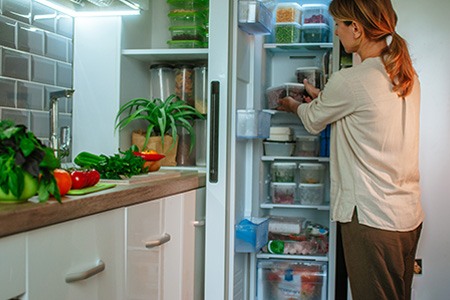
If you left your freezer door open for any period and don’t want to prematurely throw anything away, refer to the list below.
Raw Meat
If you have raw meat in an open freezer, you may keep and refreeze it as long as it has not gotten thawed. Ensure the meat is at or below freezing temperatures (32 degrees Fahrenheit).
Check for external indicators like film, smell, and ice crystal formation.
No matter what, if you leave your freezer open for longer than a day, do not refreeze raw meat. If it appears safe for consumption, cook it first before freezing. If you do refreeze it, make sure you know how long it takes for a refrigerator to get cold again so that it freezes soon enough to not risk the meat.
Cooked Meat
If you have anything containing cooked meat in your freezer, treat it similarly to raw meat. Check for these indicators of rotten food:
- Slime or film
- Rotten smell
- Ice crystal formation
If your cooked meat appears fine, consider heating it again before refreezing. Reheating the meat allows you to inspect its quality one final time.
Seafood

Seafood is more sensitive to temperature changes compared to meat and poultry. It spoils quickly. Evaluate any cooked or raw seafood with care to prevent future food-related illness.
If you leave your freezer door open and your seafood thaws, you need to cook or reheat them immediately as long as they are still cold, even if they appear fine. If they warm up, throw them away.
Fruits & Vegetables
Fruits and vegetables are not as sensitive as meat regarding freezing and refreezing restrictions. They're largely water, and it doesn't take that much volume of water long to freeze again.
Check your frozen fruits to ensure they have no scent, slime, or mold growing. If you left your freezer door open for an extended amount of time, you may notice your fruit texture and size change. They are still safe to eat but do not have the same flavor quality.
Frozen vegetables follow a similar protocol. You may consider throwing them out if they thaw because they may taste strange and become tough when chewing.
Dairy Products
Dairy products spoil quickly, so if you notice your ice cream or butter thaw or melt, it is best to throw those products away.
If you only left your freezer open for a few hours, these products should be safe to refreeze and consume later. However, you should discard anything out longer than overnight.
First Steps to Fixing Your Freezer
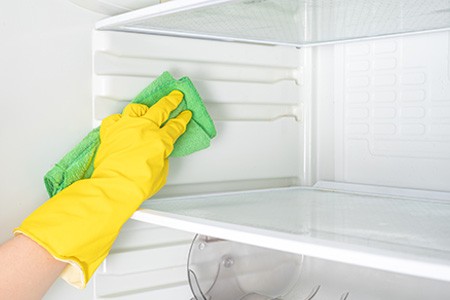
Cleaning up a freezer mess seems overwhelming, but it is necessary to maintain the health and longevity of your freezer. A good scrub and defrost is the best first step.
Sometimes, excessive ice build-up causes an improper seal. That could cause a freezer door to stay open. Try defrosting your freezer once a year to prevent ice formation.
To properly defrost and clean your freezer, follow these steps:
- Take all items out of your freezer, including food and shelves. Place them in a cooler with ice.
- Use warm water, and remove any excess ice crystals on the items and along the freezer walls.
- To loosen ice chunks, boil some water and place it inside the freezer.
- Place cloth or paper towels at the base of the freezer to catch any leaking water.
- Keep the door closed, and check about every 20 minutes until the rest of the ice melts.
- After the ice melts, wipe down your freezer with an anti-bacterial cleaner to keep the fridge from smelling bad even after cleaning. Some people prefer using diluted bleach to sanitize any food leakage.
- Dry your freezer’s interior and all of its components.
- Put the shelves back into the freezer. Then, place all salvageable food items back.
- Shut your freezer door, making sure the seal suctions correctly.
You are now good to let your freezer turn back on and return to the proper operating temperature. If it won't turn back on, cool properly, or the fridge starts making clicking noises, you may have a larger problem at hand as a consequence of overworking the appliance.
Freezer Door Left Open for How Long? That's What Matters
Any amount of time beyond an hour or two and you should begin to become concerned about the safety of consuming the food inside the freezer. If your freezer was left open overnight, then you'll likely find the food to be defrosted and no good any more, unfortunately.
Please don't take any risks with the food. It's very unfortunate to need to throw away what was perfectly good food, but it's no longer good. You'll risk getting sick from using it at this point if you find your freezer door left open for a long stretch of time.




